Diplomatic Bluebook 2020
Chapter 2
Japan's Foreign Policy that Takes a Panoramic Perspective of the World Map
4 Southeast Asia
(1) Indonesia
As a major country in the Southeast Asia region with the fourth largest population in the world (at 268 million people), Indonesia plays a leading role in ASEAN. In addition, it has been showing initiative for various challenges facing the international community as a G20 member.
Regarding domestic politics, a presidential election was held in April when the incumbent President Joko Widodo and candidate for Vice President Ma'ruf Amin contested with Prabowo Subianto, the leader of Gerindra party, and his vice-presidential candidate Sandiaga Uno. President Joko's camp won the election with a 55.5% share of the vote, and was thus reelected. Legislative elections (House of Representatives (DPR), House of Regional Representatives (DPD), Regional People's Representative Councils of Provinces, Regencies and Municipalities) took place on this same day. In the election for DPR members, the Indonesian Democratic Party of Struggle, the party fielding President Joko, gained 128 seats (with a 19.3% share of the vote) to become the dominant party. An inauguration ceremony was held for President Joko and Vice President Ma'ruf Amin on October 20, which was attended by Parliamentary Vice-Minister for Foreign Affairs Nakayama Norihiro as a representative of the Government of Japan. The “Onward Indonesia Cabinet” was announced on October 23, when the Joko administration began its second term.
High-level exchanges were actively carried out between Japan and Indonesia. At the summit-level, President Joko visited Japan in June for the G20 Osaka Summit, while Vice President Ma'ruf Amin visited Japan for the Ceremony of the Enthronement of His Majesty the Emperor. In addition, on the occasion of the ASEAN-related Summit Meeting in Bangkok, Thailand in November, a summit meeting was held between Prime Minister Abe and President Joko, for the first time since the start of the Joko administration's second term. Ministerial-level exchanges were also active. On the occasion of the G20 Aichi-Nagoya Foreign Ministers' Meeting, Minister for Foreign Affairs Retno, who remained in office for the second term of the Joko administration, visited Japan and held the first Foreign Ministers' Meeting with Foreign Minister Motegi. Through these high-level exchanges, the two sides affirmed their cooperative relations in areas such as politics and security, economy and infrastructure development, maritime issues, disaster prevention, and people-to-people exchanges. They also affirmed that they would continue to further strengthen coordination over regional issues such as the South China Sea and North Korea.
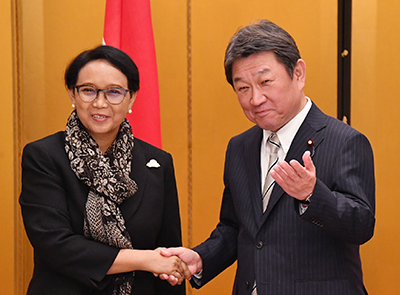 Japan-Indonesia Foreign Ministers' Meeting
Japan-Indonesia Foreign Ministers' Meeting (November 22, Nagoya)
(2) Cambodia
Cambodia is a key country in strengthening connectivity in the Mekong region and narrowing the regional development gap in the Southeast Asian region. Based on its regional advantages of being located in a strategic place of the Southern Economic Corridor and its annual economic growth rate of 7%, the country has been promoting a development policy with emphasis on the enhancement of governance, with the aim of entering the group of Upper Middle-Income Countries by 2030.
Japan has been cooperating actively with Cambodia, including through the Cambodian peace process since the late 1980s and its subsequent reconstruction and development process. Cambodia was the first country to which Japan deployed PKO from 1992 to 1993, and Japan has been deepening its relations with Cambodia in various different areas in recent years in the country's capacity as the starting point for Japan's “Proactive Contributions to Peace.” In 2013, the relations between the two countries were elevated to a “Strategic Partnership.” In 2019 there were active reciprocal visits by key officials, including a visit to Japan by H.M. Preah Bat Samdech Preah Boromneth Norodom Sihamoni, King of Cambodia, to attend the Ceremony of the Enthronement of His Majesty the Emperor in October, where he held talks with Prime Minister Abe, as well as a summit meeting with Prime Minister Hun Sen during his visit to Japan in May. Foreign ministers' meetings were also held in August and December.
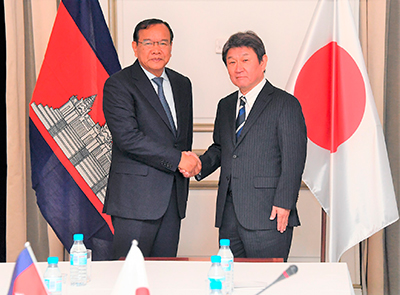 Japan-Cambodia Foreign Ministers' Meeting
Japan-Cambodia Foreign Ministers' Meeting (December 15, Madrid, Spain)
Regarding domestic affairs, the Cambodian Government has taken measures against opposition parties, the media, and civil society, including its order to dissolve the Cambodia National Rescue Party, the largest opposition political party, in 2017. Based on such measures, as well as the results of the Cambodian National Assembly election from 2018, the country has faced continued criticism both domestically and internationally, including from civil society. On the other hand, the Cambodian Government has held dialogues with domestic opposition parties and regular meetings with members of civil society. It has also adopted measures such as allowing the leader of the former Cambodia National Rescue Party, who has been under criminal investigation since 2017, to travel freely within the country. In the interest of lending its backing to democratic development in Cambodia, based on an agreement between the two Prime Ministers in October 2018, Japan has invited young Cambodians involved in politics on a total of three occasions. It has also extended invitations to election officials, including members of civil society, as well as high-ranking government officials in charge of partnership with civil society.
In the Khmer Rouge Tribunal, which Japan has been supporting for many years, one of the two leaders who received sentences of life imprisonment via a Trial Court Chamber judgment in 2018 passed away. Judicial proceedings are ongoing with respect to a total of four cases, which include appeal proceedings for the remaining leader (see the Special Feature below).
Cambodia has suffered a long period of turmoil, but has now emerged as a country that is achieving rapid economic growth. However, the emotional scars of the people who experienced the massacres under the Khmer Rouge (KR) and civil war have not healed completely, and continue to have an impact on society even today. On the other hand, the younger generation, which has not experienced the KR regime and civil war, now make up about half of the population. Generation change is progressing gradually as Cambodia approaches a transitional period for society, and there is growing need for the country to pass on its past experiences to the next generation and link them to the future. This section features one such initiative that Japan provides support for – the Extraordinary Chambers in the Courts of Cambodia (ECCC) and the Legal Documentation Center which holds court documents of these Chambers.
Extraordinary Chambers in the Courts of Cambodia (ECCC)
The KR regime is said to have massacred presumably one to two million during its ruling period between 1975 and 1979, under radical communist ideology. Although the Paris Peace Agreements were achieved in 1991, the KR continued with its resistance activities, while the regime was never formally held responsible for its acts committed during its rule. In 2006, the ECCC finally launched their judicial work to judge the senior leaders of the KR regime. To date, three leaders including the former Head of State have been convicted and sentenced to life imprisonment. Appeal proceedings for suspicion of a separate offense are still ongoing for one of the three, while court proceedings are ongoing for another three military and local senior officials.
Unlike the International Criminal Tribunal for the Former Yugoslavia and the International Criminal Tribunal for Rwanda, both of which were established by the UN, the ECCC was established in cooperation with the UN as a special court in Cambodia, where the crimes were committed, to provide judgements for crimes during the KR regime in accordance with relevant Cambodian domestic law and international law under the agreement between Cambodia and the UN in 2003. To date, 240,000 people have sat in to observe the trials; this number rises to 620,000 people if participants of court visitations, etc. are included. Through the adoption of the victim participation system, it has also become possible for people to discuss their experiences of the massacre with others, which had been taboo before. Moreover, the KR Tribunal is viewed as a model for Cambodia's judicial reform, and its approach of court management based on international standards has also been applied to domestic courts. The KR Tribunal has also contributed to developing the capacity of judicial officers in Cambodia, who are acquiring international standard knowledge.
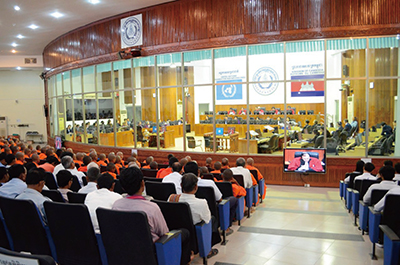
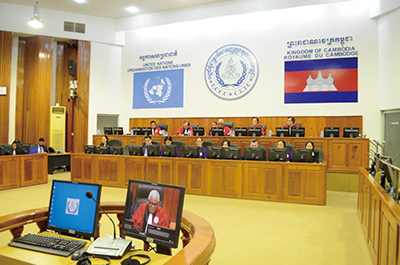 Public hearing by the pre-trial court concerning the third case
Public hearing by the pre-trial court concerning the third case (filing of objection against order to close investigations) (November 27, Photo: ECCC)
Legal Documentation Centre relating to the Extraordinary Chambers in the Courts of Cambodia (LDC)
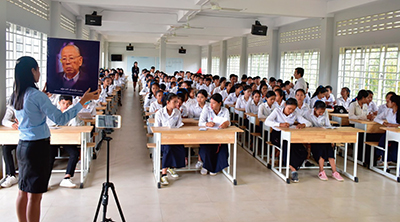 Outreach activity by LDC at Samdach Ouv High School in Siem Reap Province
Outreach activity by LDC at Samdach Ouv High School in Siem Reap Province (December 5, Photo: LDC)
Recently, the KR era has been introduced into history education for high school students. Nevertheless, Cambodian youths still have limited opportunities to learn objectively about the time of the KR. In light of this, the Legal Documentation Center (LDC) of the KR Tribunal was opened in the capital city, Phnom Penh, in June 2017. LDC provides educational and research resources through the archiving and disclosure of copies of court documents to the general public. At the same time, it helps to disseminate and raise awareness about court activities. In 2018, 1,695 people visited the LDC. There are expectations that the LDC will take on a central role in the further advancement of initiatives to pass on past experiences to the next generation.
Japan's support and hope
Japan positions the swift and successful conclusion of the KR Tribunal as the completion stage of the Cambodian peace process. To that end, Japan has not only provided financial assistance of approximately 87 million US dollars, which makes up about 30% of all international assistance, but also contributed to human resources by dispatching Japanese officers, one of whom served as an international judge of the Supreme Court Chamber. It has also provided assistance to cover part of the costs for the development of the LDC building and internal facilities, as well as some activity expenditures. It is not an easy task for the people and society of Cambodia that once used to kill those of the same race, and who bear hatred and distrust, to restore trust once again. However, Japan, as a country that has consistently supported Cambodia since the attainment of peace to the present day, will continue to support the efforts of the Cambodian people to learn from the past, overcome conflict, and stand united as one toward the future.
(3) Singapore
Singapore is the most economically advanced country within ASEAN. Based on its omnidirectional foreign policy, the country maintains friendly relations with major countries including the U.S. and China.
In Singapore, the People's Action Party (PAP), led by Prime Minister Lee Hsien Loong, occupies an overwhelming majority of seats in the Parliament. With the Cabinet reshuffle in May, Minister for Finance Heng Swee Keat was appointed Deputy Prime Minister in addition to his current role, and is being regarded as a candidate for the next prime minister, which means steady preparations toward a change of generations.
High-level exchanges continued in 2019 between Japan and Singapore. In May, Deputy Prime Minister and Minister for Finance Heng Swee Keat visited Japan immediately following his appointment as Deputy Prime Minister, where he paid a courtesy call on Prime Minister Abe. Prime Minister Lee Hsien Loong also visited Japan in June to attend the G20 Osaka Summit, followed by the visit of Emeritus Senior Minister Goh Chok Tong (former Prime Minister) in August to attend the Seventh Tokyo International Conference on African Development (TICAD7) and that of President Halimah Yacob in October to attend the Ceremony of the Enthronement of His Majesty the Emperor, when the summit meeting and other exchanges took place. On the occasion of the ASEAN-related Summit Meeting in Thailand in November, Prime Minister Lee Hsien Loong and Prime Minister Abe held their second summit meeting of the year, where Prime Minister Lee Hsien Loong announced plans to lift the remaining import restrictions on food products produced in Fukushima Prefecture. In addition, when Minister of Foreign Affairs Balakrishnan visited Japan to attend the G20 Aichi-Nagoya Foreign Ministers' Meeting, he held a meeting with Foreign Minister Motegi. At the meeting, they exchanged views on promoting free trade, and affirmed their coordination with a view toward the early conclusion of the Regional Comprehensive Economic Partnership (RCEP). They also discussed regional issues such as the South China Sea issue and the situation in North Korea, and reaffirmed their coordination.
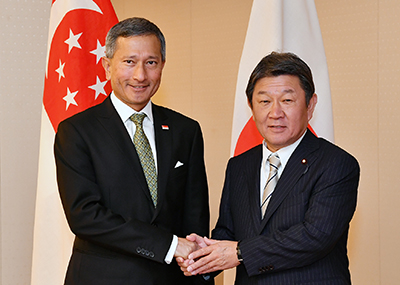 Japan-Singapore Foreign Ministers' Meeting
Japan-Singapore Foreign Ministers' Meeting (November 22, Tokyo)
The two countries have worked together to provide developing countries with technical assistance through the “Japan-Singapore Partnership Program for the 21st Century (JSPP21)” which was signed in 1997. To date they have amassed a track record of providing training approximately 400 times with roughly 6,900 participants from ASEAN countries and other regions. The Japan Creative Centre (JCC), which was established in Singapore as a platform to promote Japanese culture, has marked its 10th anniversary in 2019. The JCC actively engages in cultural exchanges, by holding bunraku puppet performances and other commemorative events.
(4) Thailand
Thailand is located in the center of the Mekong region and is geopolitically important. It also has many production bases of Japanese companies as a result of investment accumulated over the years, and it now serves as an essential element of the Japanese economy as part of global supply chains. Under the assembly and interim cabinet established by the military government, an election for the House of Representatives was held on March 24, 2019 in order to restore the country's civil government. As a result of negotiations to form a coalition following the election, a new administration was launched on July 16 in which Prime Minister Prayut Chan-o-cha would continue on in his role.
Various levels of exchanges, including political and economic ones, have been continued between Japan and Thailand on the foundation of the close relationship between the imperial and royal families and the “Strategic Partnership” relations. Active exchanges were continued at various levels between the two countries in 2019 as well, during which Japan and Thailand served as the chair for the G20 and ASEAN respectively. In May Minister of Foreign Affairs Don visited Japan to attend the Thai Festival, while Prime Minister Prayut visited in June to attend the G20 Osaka Summit. Moreover, in July Foreign Minister Kono visited Thailand to attend the ASEAN-related Foreign Ministers' Meetings, and Prime Minister Prayut visited Japan again in October in order to attend the Ceremony of the Enthronement of His Majesty the Emperor. In November Prime Minister Abe visited Thailand to attend the ASEAN-related Summit Meetings.
(5) Timor-Leste
Timor-Leste, the first country which achieved independence in the 21st century (in 2002), is a strategically important country in the Indo-Pacific region, and is situated in an important sea lane between Australia and Indonesia. The country has realized peace and stability with the support of the international community and has been building the nation based on democracy. As its economy is highly dependent on natural resources such as petroleum and natural gas, the country has been working to diversify its industry as a matter of the highest national priority.
In diplomatic relations, the country has made vigorous efforts toward achieving the accession of Timor-Leste to ASEAN, which is the most important diplomatic agenda. In this context in the summer of 2019 Minister for Foreign Affairs and Cooperation Babo made a round of visits to ASEAN countries to hold talks with dignitaries.
On the domestic front, a confrontation between the ruling parties, which inaugurated the Eighth Constitutional Government in June 2018, and President Lu-Olo, led to a state of persistent political deadlock.
The year 2019 marked the 20th anniversary of the Popular Consultation in which Timorese people voted to restore independence, as well as the start of Japan's assistance for Timor-Leste, and was marked by vigorous high-level visits. Minister for Foreign Affairs and Cooperation Babo visited Japan (in March), while Special Advisor to the Prime Minister Sonoura Kentaro visited Timor-Leste (in April). Parliamentary Vice-Minister for Foreign Affairs Suzuki Norikazu also visited Timor-Leste (in August) to attend the ceremony for the 20th anniversary of the Popular Consultation in Timor-Leste. Through this series of high-level visits, the two sides strengthened bilateral cooperation in areas such as education, human resource development, people-to-people exchanges, economy and infrastructure, and politics and security. They also enhanced the trilateral cooperation among Japan, Timor-Leste and Indonesia in the maritime field and others, as well as regional coordination.
(6) The Philippines
The Philippines is a maritime nation comprised of more than 7,000 islands located in the South China Sea. It has maintained real GDP growth of approximately 6%, thanks to remittances from overseas workers as well as high domestic demand attributable to sustained population growth. Throughout 2019, President Duterte, who assumed office in June 2016, continued to demonstrate strong leadership and enjoyed a high approval rating and robust economic fundamentals. The Mindanao peace process witnessed milestone achievements as the Bangsamoro Transition Authority was constituted in February, followed by the official commencement of disarmament activities in September (see the Special Feature on page 65). As for nationwide public safety enhancement, the Duterte administration continued to make progress on its focal policies of illegal drug control, eradication of corruption, public order maintenance, and counter-terrorism offensives. Economically, tax reforms have been advancing steadily, in instances like the coming into force of the Comprehensive Tax Reform Program (CTRP). The series of tax reforms have been met with strong popular support, and thus led to a landslide victory in favor of the president and his allies in the mid-term elections in May.
Indicative of the Japan-Philippines “strategic partnership,” high-level officials actively exchanged visits between the two countries. Foreign Minister Kono was among those from Japan to visit the Philippines (in February), as well as Minister of Justice Yamashita Takashi (in July). Japan received visits by Secretary of Foreign Affairs Locsin (in May) and Secretary of Finance Dominguez (in February, May, and December). In addition, Japan-Philippines Summit Meetings were held between Prime Minister Abe and President Duterte on two occasions (in May and November), while Japan-Philippines Foreign Ministers' Meetings took place three times (in February, May, and August).
In June, Japan and the Philippines convened Political-Military (PM) & Military-Military (MM) Dialogues and Maritime Dialogues to galvanize bilateral policy coordination on security matters. On the economic front, Japan has continued to provide powerful support to the Philippine Government's robust infrastructure development policy, “Build, Build, Build,” by way of convening three meetings of the Japan-Philippines High Level Joint Committee on Infrastructure Development and Economic Cooperation (the 7th in February, the 8th in June, and the 9th in December), a mechanism that was launched to steadily implement Prime Minister Abe's January 2017 pledge to render assistance to the tune of 1 trillion yen over five years.
Japan signed a memorandum of cooperation with the Philippines, ahead of other countries, in March in relation to the new residency status, “Specified Skilled Worker,” and has since held examinations for candidates in nursing among others based on the memorandum. The Government of the Philippines made a decision on lifting the import restrictions placed on marine products from Fukushima Prefecture since the Great East Japan Earthquake.
Mindanao encompasses the region that includes Mindanao Island and the Sulu Archipelago in the southern part of the Philippines. Endowed with lush green mountains and the beautiful ocean, Mindanao is home to thriving agriculture on its fertile lands as well as a diversity of cultures and religious faiths. Most of the banana and pineapple produce available at supermarkets in Japan are harvested on plantations in Mindanao. In addition, President Duterte is the first president in the Philippines' history to hail from Mindanao. Mr. Manny Pacquiao, a world-famous boxer and an incumbent Senator, is also a native of Mindanao.
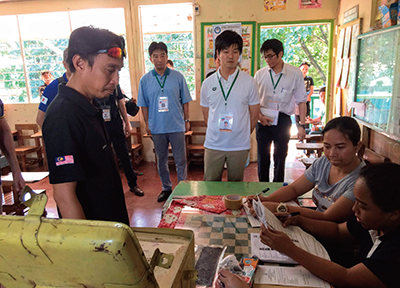 Parliamentary Vice-Minister for Foreign Affairs Suzuki observing the plebiscite for establishing an autonomous government in the Bangsamoro region (January 21, Cotabato City, Philippines)
Parliamentary Vice-Minister for Foreign Affairs Suzuki observing the plebiscite for establishing an autonomous government in the Bangsamoro region (January 21, Cotabato City, Philippines)Mindanao was the historically contested arena between the indigenous Moro people and the Philippine Government. Since 1969, militant groups aspiring to establish a Muslim nation-state, such as the Moro National Liberation Front (MNLF), continued to wage an armed separatist campaign. Despite repeated failed attempts at peace-making, persistent negotiations have made great strides on the peace process in recent years, fructifying into the enactment of the Bangsamoro*1 Organic Law in July 2018 and the establishment of the Bangsamoro Transition Authority in February 2019 through a plebiscite on constituting an autonomous government. The great challenge at hand is to ensure that the peace dividends are tangible for the people who have been left behind from an avalanche of development projects amid more than 40 years of conflict.
For nearly 20 years since the announcement of the “Support Package for Peace and Stability in Mindanao” by then Prime Minister Koizumi in 2002, the Government of Japan has been providing comprehensive support ranging from the advancement of the peace process to reconstruction and development in cooperation with the Philippine Government and the Moro Islamic Liberation Front (MILF), among others.
An initiative that epitomizes Japan's commitment is the concentrated implementation of development cooperation projects, dubbed “J-BIRD*2,” which derives its name from the figure of a dove─a symbol of peace─flying over Mindanao. J-BIRD was launched in December 2006 when Prime Minister Abe visited the Philippines in recognition of the importance of economic development benefitting residents for the sustainable stability and development of Mindanao. Through J-BIRD, more than 50 billion yen has been disbursed to date (as of December 2019) in order to assist administrative capacity ahead of the inception of an autonomous government, livelihoods improvement, industrial and infrastructure development, and construction of schools and agricultural facilities in more than 350 villages. Lately, in an effort to stabilize the region, Japan has also been providing assistance in the form of vehicle and equipment procurement for the Joint Peace and Security Teams (JPST) and the Independent Decommissioning Body (IDB), which are responsible for the disarmament and decommissioning of MILF soldiers, on top of direct assistance to the Bangsamoro Transition Authority. Japan also deploys staffers of the Embassy of Japan in the Philippines to the International Monitoring Team (IMT), an official ceasefire-monitoring body, for needs assessment, project formulation, and ex-post monitoring in the areas affected by the conflict.
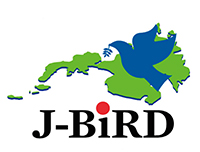 Logo of J-BIRD
Logo of J-BIRD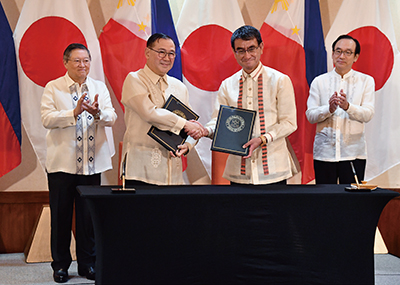 Foreign Minister Kono attending the ceremony for the signing and exchange of notes on the “Road Network Development Project in Conflict-Affected Areas in Mindanao,” one of the projects under J-BIRD
Foreign Minister Kono attending the ceremony for the signing and exchange of notes on the “Road Network Development Project in Conflict-Affected Areas in Mindanao,” one of the projects under J-BIRD (February 10, Davao, Philippines)
The array of support to the Mindanao peace process by the Government of Japan is widely known to the residents of Mindanao; Philippine dignitaries including President Duterte have on multiple occasions expressed their appreciation for it. The progress of the peace process is of utmost importance, not only to the Philippines, but also to the growth and prosperity of the Indo-Pacific region and with respect to leaving no room for a hotbed of terrorism in the region. Going forward, the Government of Japan will continue to strengthen its assistance as the peace process progresses.
- *1 Bangsamoro means “land of the Moro people (an indigenous people of Mindanao)” in the local language.
- *2 J-BIRD: Japan-Bangsamoro Initiatives for Reconstruction and Development
(7) Brunei
Its abundance in natural resources has enabled Brunei to realize a high economic standard and generous social welfare. As such, the country enjoys political and economic stability. Located in the center of Southeast Asia, the country has adopted a balanced diplomacy built on the pillar of promoting ASEAN unity and centrality.
As for the recent economic situation, the economic growth rate has fallen since 2014 due to causes such as drastically falling prices of crude oil around the world. Although there has been a positive recovery in the economic growth rate from the second quarter of 2017 due to gradually rising oil and gas prices, the Government of Brunei is aiming for economic diversification to avoid overreliance on energy resources.
Since Japan and Brunei established diplomatic relations immediately after the independence of Brunei in 1984, the two countries developed excellent bilateral relations in various areas that include politics, defense, economy, culture, and personal exchanges. In addition, the two countries enjoy a close relationship between the imperial and royal families. Brunei is an important country for the stable supply of energy resources to Japan. Around 60% of Brunei's liquefied natural gas (LNG) exports are bound for Japan, and LNG from Brunei makes up around 5% of the total LNG import to Japan. On the cultural front, the countries engage in youth exchange projects such as “JENESYS2.0”24 and the Cabinet Office's Ship for Southeast Asian Youth Program, as well as frequent exchanges in sports such as badminton and judo.
As a reflection of the good bilateral relations, reciprocal visits by key officials continued to be actively carried out in 2019. His Majesty Sultan Haji Hassanal Bolkiah visited Japan in October to attend the Ceremony of the Enthronement of His Majesty the Emperor, and during the visit a summit meeting was held with Prime Minister Abe. During the talks, Sultan Bolkiah announced that Brunei would lift the import restrictions on Japanese food products that had been in place since the Great East Japan Earthquake. In addition, Minister of Foreign Affairs II Dato Erywan, who accompanied His Majesty to Japan, and Foreign Minister Motegi held a foreign ministers' meeting. There they confirmed to further strengthen the bilateral relations, and continue their close coordination with respect to regional affairs.
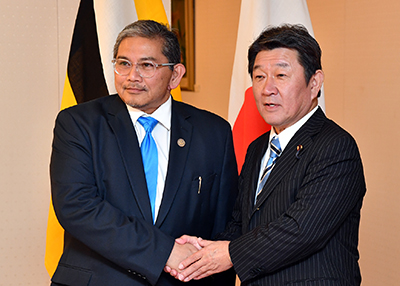 Japan-Brunei Foreign Ministers' Meeting (October 21, Tokyo)
Japan-Brunei Foreign Ministers' Meeting (October 21, Tokyo)- 24 JENESYS: Japan-East Asia Network of Exchange for Students and Youths
(8) Viet Nam
Located next to sea lanes in the South China Sea and sharing a long border with China, Viet Nam is a geopolitically important country. Given that the country embraces the third largest population in Southeast Asia, and is experiencing a surge in the number of people in middle-income brackets, Viet Nam is a promising market. The country is currently striving to realize stable economic growth through the stabilization of the macroeconomy including control of inflation, the promotion of foreign investment by the development of infrastructure and the improvement of the investment environment. Moreover, the Government has been engaging actively in administrative reform and anti-corruption measures.
Japan and Viet Nam have been advancing cooperation in a variety of areas under the Extensive Strategic Partnership for Peace and Prosperity in Asia. High level officials have made frequent visits to each country. In January State Minister for Foreign Affairs Abe Toshiko visited Viet Nam and took part in the 6th Japan Vietnam Festival in Ho Chi Minh City, which is the largest exchange event between the two countries in Viet Nam. In May, Vietnamese Deputy Prime Minister and Minister of Foreign Affairs Minh visited Japan to attend the International Conference on the Future of Asia. During his visit, both foreign ministers held the Japan-Viet Nam Cooperation Committee and a foreign ministers' meeting. In June Prime Minister Phúc visited Japan to attend the G20 Osaka Summit, and he had a summit meeting with Prime Minister Abe. Prime Minister Phúc visited Japan once again in October to attend the Ceremony of the Enthronement of His Majesty the Emperor.
Viet Nam has essentially been a country with great affinity toward Japan. The number of Vietnamese visiting Japan grew from about 40,000 in 2011 to over 380,000 in 2018. The number of Vietnamese living in Japan rose from about 40,000 in 2011 to about 370,000 in June 2019, the third largest group of foreign residents after China and South Korea.
(9) Malaysia
Comprised of the Peninsular Malaysia of the Malay Peninsula and East Malaysia of Borneo, Malaysia is a geopolitically important country facing the South China Sea and Strait of Malacca that is situated in a crucial spot in the Indian Ocean and Pacific Ocean. In addition, it is a federal state comprised of 13 states and three federal territories, and also a multiethnic state comprised of ethnically Malay, Chinese and Indian people, among others.
In the 14th Dewan Rakyat general election held in May 2018, the opposition alliance (the Alliance of Hope, or Pakatan Harapan) led by former Prime Minister Mahathir (fourth Prime Minister) acquired a majority, and there was a change of administration for the first time since Malaysia achieved independence in 1957. Prime Minister Mahathir became Malaysia's seventh Prime Minister, and has been working to restore the rule of law, improve transparency and governance, and reduce the country's debt. In May 2019 Prime Minister Mahathir visited Japan, and confirmed to strengthen the “Strategic Partnership” through revitalizing the Look East Policy in the summit meeting, and issued a fact sheet entitled “Japan-Malaysia Cooperation – Look East Policy Revisited in the New Era.” In August, Foreign Minister Kono held a foreign ministers' meeting with Minister of Foreign Affairs Saifuddin on the occasion of the ASEAN-related Foreign Ministers' Meeting (in Thailand). In October Sultan Abdullah Sultan Ahmad Shah visited Japan to attend the Ceremony of the Enthronement of His Majesty the Emperor, where he held a meeting with Prime Minister Abe. Successively, cabinet ministers from Malaysia visited Japan, and reciprocal visits by key officials were actively carried out between the two countries.
Cooperation has advanced across a number of areas which includes the issuance of samurai bonds (yen-denominated bonds) in March and the signing of a memorandum of cooperation on the solid waste area in September.
Through the Look East Policy, which serves as a foundation for the good bilateral relationship between Japan and Malaysia and was proposed by Prime Minister Mahathir in 1981, approximately 17,000 Malaysian people have studied or have been trained in Japan so far. The two countries have been cooperating in making the Malaysia Japan International Institute of Technology (MJIIT), which was opened in September 2011, a base for Japanese-style engineering education in ASEAN countries.
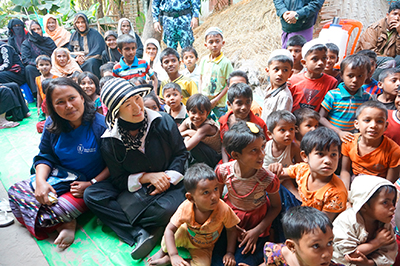 State Minister for Foreign Affairs Abe visiting a site for food distribution assistance in Rakhine State, Myanmar
State Minister for Foreign Affairs Abe visiting a site for food distribution assistance in Rakhine State, Myanmar (January 15, northern Maungdaw Township, Myanmar)
On the economic front, Japan is the biggest investor to Malaysia, and roughly 1,300 Japanese companies have been operating in Malaysia, which demonstrates continued close cooperation between the two countries.
(10) Myanmar
In Myanmar, the current administration led by State Counsellor Aung San Suu Kyi has been making efforts for the consolidation of democracy, national reconciliation, and economic development. Japan is providing full-fledged support to Myanmar's democratic nation building by bringing together the public and private sectors, based on the recognition that the stability of Myanmar, which has a historical friendship with Japan, has huge potential for economic development, and geopolitical importance is directly related to stability and prosperity throughout the entire region. In 2016, Prime Minister Abe expressed the intention that Japan would contribute 800 billion yen in total through the public and private sectors over five years from FY2016 to 2020. Since then, Japan has been materializing its cooperation in various fields, including urban development, electricity, and transportation infrastructure. In October 2018, Prime Minister Abe conveyed to State Counsellor Aung San Suu Kyi, who was visiting Japan, that Japan would implement new assistance projects to enhance civic life in the Yangon metropolitan area. In 2019 Foreign, Minister Kono visited Myanmar in July, where he held talks with State Counsellor Aung San Suu Kyi. In addition, State Counsellor Aung San Suu Kyi visited Japan in October to attend the Ceremony of the Enthronement of His Majesty the Emperor.
There has been continuous tension since the conflict between communities began in 2012 in the western state of Rakhine. More than 700,000 people were displaced to Bangladesh due to the armed group's attacks on Myanmar security forces' bases in August 2017, the security forces' operation, and the subsequent destabilization of the situation. Together with the international community, Japan has been urging the Government of Myanmar to implement the “safe, voluntary, and dignified” return of displaced persons and create an environment conducive to repatriation with the involvement of the UN. Japan is also implementing humanitarian aid for displaced persons and host communities on the Bangladesh side and displaced persons and residents in Rakhine State. In addition, Japan is urging the Government of Myanmar to implement a transparent and credible investigation on allegations of human rights violations in Rakhine State with the involvement of the international community, and to take appropriate measures accordingly. State Minister for Foreign Affairs Abe visited Myanmar in January 2019, where she conveyed Japan's position on the issue in Rakhine State to officials from the Government of Myanmar, and observed the provision of assistance from Japan and the UN.
In Myanmar, achieving peace with ethnic armed groups, who have been fighting against the Myanmar military since its independence, has also been a pressing issue. By February 2018, 10 ethnic armed groups, including Karen National Union (KNU), had signed the Nationwide Ceasefire Agreement (NCA). Japan is promoting dialogues between stakeholders in cooperation with Mr. Sasakawa Yohei, Special Envoy of the Government of Japan for National Reconciliation in Myanmar. Japan is also implementing reconstruction and development assistance, including infrastructure such as houses, schools and, medical facilities, agricultural technique training, and electrification of houses through solar panels in cooperation with Japanese NGOs in Southeast Myanmar, including Karen State and Mon State, to improve the living standards of the residents in the areas where there is a ceasefire.
(11) Laos
Laos is a land locked country bordering the five countries of China, Myanmar, Thailand, Cambodia and Viet Nam, and therefore is a key country in connecting the Mekong region. After the holding of the 10th Congress of the Lao People's Revolutionary Party and the 8th National Parliamentary Elections in 2016, regarding domestic affairs, 2019 has been a year of stable administrative operation under the single-party rule of the Lao People's Revolutionary Party. On the economic front, the country has worked to stabilize its financial situation as a matter of the utmost priority. On the other hand, economic growth remained steady at around 7%, which was about the same level as the previous year, driven by electricity and mineral resources. In regard to relations between Japan and Laos, reciprocal visits by key officials were actively carried out in 2019 as well. In May Prime Minister Thongloun and Minister of Foreign Affairs Saleumxay visited Japan together, during which a summit meeting and foreign ministers' meeting were held. Vice President Phankham visited Japan on two occasions, once in October to attend the Ceremony of the Enthronement of His Majesty the Emperor and again in November to attend the Ceremony of Imperial Conferment of Decoration (Grand Cordon of the Order of the Rising Sun). From the Japan side as well, State Minister for Foreign Affairs Abe visited Laos in June, as did State Minister for Foreign Affairs Wakamiya in October, respectively, through which momentum has been maintained for close, high-level exchanges in recent years under the “Strategic Partnership.” Regarding support in financial stability strongly requested by the leaders of the Government of Laos, Japan continued to cooperate at multiple levels in the public and private sectors by dispatching experts, holding various seminars, etc. In addition, in response to the natural disasters such as flooding that occur throughout the entirety of Laos on a yearly basis, the Government of Japan provided equipment and supplies conducive to improving the country's disaster prevention and disaster response capabilities based upon a request from the Government of Laos. It also provided assistance for restoration and reconstruction through international agencies. In June, the Project for Improvement of the National Road Route 9, which is a symbolic project for strengthening connectivity in the Mekong region, was completed, and a grand handover ceremony was conducted with the attendance of high-level officials from both countries. This project demonstrated the strengthening of regional connectivity by the Government of Japan toward achieving a “Free and Open Indo-Pacific.” In this way, in the area of economic cooperation, steady progress has been seen in 2019 for the “Japan-Lao PDR Joint Development Cooperation Plan” announced by both leaders in September 2016. Regarding cultural exchange, the “Japan Festival” was held in Vientiane in February followed by the “Laos Festival” in Tokyo in May, both of which deepened mutual understanding by the peoples of both countries.
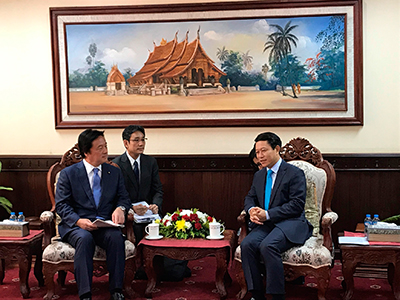 Talks between State Minister for Foreign Affairs Wakamiya and Minister of Foreign Affairs Saleumxay of Laos
Talks between State Minister for Foreign Affairs Wakamiya and Minister of Foreign Affairs Saleumxay of Laos (October 5, Laos)


